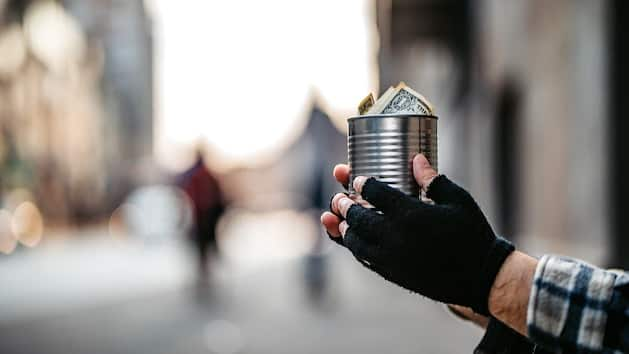Who would you give more money for the homeless: a simply dressed man or a neatly dressed man? In fact, one would expect a needy-looking person to experience more helpfulness. But the opposite is the case, according to New York University psychologist Bennett Callaghan and his colleagues from Columbia and Yale University in the journal Frontiers in Psychology.
Study author Callaghan researches the causes and possible solutions to social inequality at the Stone Center for Socio-Economic Inequality. To this end, he himself appeared as a supplicant at the field experiment on the streets of New York and Chicago. On weekdays he would stand on the street and ask for a donation for the homeless with a paper cup and a sign.
The bearded psychologist wore either plain dark jeans and a blue T-shirt, or a dark suit with a white shirt and blue tie, and had his hair neatly styled with gel. In all, around 4500 people walked past him, and under both conditions not even one in 50 gave a small donation.
But with a suit and tie, he got on average two and a half times as much money as in the modest wardrobe. Callaghan even received donations of five dollars or more exclusively in the suit, as the researchers report in a press release. According to their own statements, they donated the sum collected as part of the experiment to charities for the homeless.
The surprising sight – a man in a suit collecting for the homeless – was probably not the reason, they continue to write. Because then it would have been expected that the passers-by would react differently, for example saying something to him. But that didn’t happen. In fact, a follow-up survey showed that the supplicant was judged differently depending on how they dressed: in a suit, they appeared more competent, warm-hearted and even more human, and respondents felt more like this person.
The researchers explain that the perceived resemblance leads to more empathy. Status symbols such as clothing serve as a means of identification: anyone who is comparatively wealthy is more likely to recognize themselves in a person whose appearance suggests a similar status, and that encourages the willingness to help. Conversely, the presumed affiliation to a less privileged class of society could limit the willingness to help.
“Gold-Rosi” Mittermaier is dead. The winter sports athlete died at the age of 72 after a serious illness. “Gold-Rosi” won two gold medals for Germany at the 1976 Winter Olympics.
“Dark-skinned”, “refugees”, “illegal migrants” – Berlin police officers should no longer use such terms. The State Criminal Police Office has issued corresponding recommendations. FOCUS online is the 29-page catalog, which should cause heated discussions.
The original of this article “A good suit helps you to become more rich” comes from Spektrum.de.















